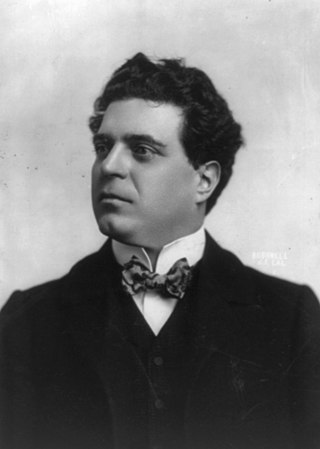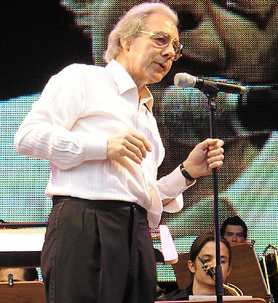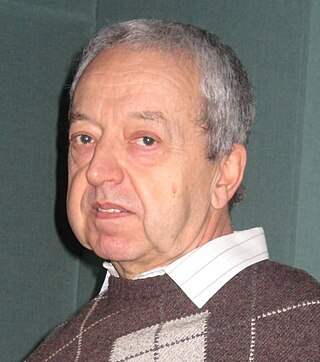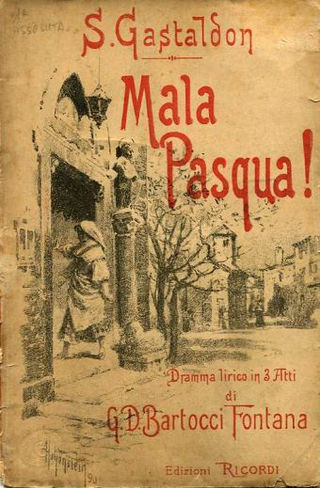
Pietro Mascagni was an Italian composer primarily known for his operas. His 1890 masterpiece Cavalleria rusticana caused one of the greatest sensations in opera history and single-handedly ushered in the Verismo movement in Italian dramatic music. While it was often held that Mascagni, like Ruggero Leoncavallo, was a "one-opera man" who could never repeat his first success, L'amico Fritz and Iris have remained in the repertoire in Europe since their premieres.

Giovanni Battista Draghi, usually referred to as Giovanni Battista Pergolesi, was an Italian Baroque composer, violinist, and organist, leading exponent of the Baroque; he is considered one of the greatest Italian musicians of the first half of the 18th century and one of the most important representatives of the Neapolitan school.

John Barry Prendergast was an English composer and conductor of film music. Born in York, Barry spent his early years working in cinemas owned by his father. During his national service with the British Army in Cyprus, Barry began performing as a musician after learning to play the trumpet. Upon completing his national service, he formed a band in 1957, the John Barry Seven. He later developed an interest in composing and arranging music, making his début for television in 1958. He came to the notice of the filmmakers of the first James Bond film Dr. No, who were dissatisfied with a theme for James Bond given to them by Monty Norman. Noel Rogers, the head of music at United Artists, approached Barry. This started a successful association between Barry and the Bond series that lasted for 25 years.

Sylvano Bussotti was an Italian composer of contemporary classical music, also a painter, set and costume designer, opera director and manager, writer and academic teacher. His compositions employ graphic notation, which has often created special problems of interpretation. He was known as a composer for the stage. His first opera was La Passion selon Sade, premiered in Palermo in 1965. Later operas and ballets were premiered at the Teatro Comunale di Firenze, Teatro Lirico di Milano, Teatro Regio di Torino and Piccola Scala di Milano, among others. He was artistic director of La Fenice in Venice, the Puccini Festival and the music section of the Venice Biennale. He taught internationally, for a decade at the Fiesole School of Music. He is regarded as a leading composer of Italy's avantgarde, and a Renaissance man with many talents who combined the arts expressively.

Júlio Medaglia is a Brazilian composer, arranger, and conductor. Born in São Paulo, he studied theory and conducting with Hans-Joachim Koellreutter. He continued his studies at the Musikhochschule in Freiburg, Germany, and privately with Pierre Boulez, Karlheinz Stockhausen, and Sir John Barbirolli, with whom he worked as assistant conductor.

Boris Claudio "Lalo" Schifrin is an Argentine-American pianist, composer, arranger, and conductor. He is best known for his large body of film and TV scores since the 1950s, incorporating jazz and Latin American musical elements alongside traditional orchestrations. He is a five-time Grammy Award winner; he has been nominated for six Academy Awards and four Emmy Awards.

Catarina ou la Fille du bandit is a ballet in three acts and four scenes, with libretto and choreography by Jules Perrot and music by Cesare Pugni. The libretto is based on an incident in the life of the Italian painter Salvator Rosa. The work was first presented by the Ballet of Her Majesty's Theatre on 3 March 1846 in London, England, with Lucile Grahn, Louis-François Gosselin, and Jules Perrot.

Giancarlo De Sisti is a retired Italian footballer and football manager and midfielder player.

Antonio Pini-Corsi was a Dalmatian Italian operatic baritone of international renown. He possessed a ripe-toned voice of great flexibility and displayed tremendous skill at patter singing. Pini-Corsi participated in numerous operatic premieres, portraying on stage such characters as Ford in Giuseppe Verdi's Falstaff and Schaunard in Giacomo Puccini's La bohème. Part of the first generation of recorded musicians, Pini-Corsi was one of the finest buffo singers of his era.
The Nastro d'Argento is a film award assigned each year, since 1946, by Sindacato Nazionale dei Giornalisti Cinematografici Italiani, the association of Italian film critics.

Lorenzo "Renzo" Mongiardino was an Italian architect, interior designer, and production designer. He was nominated for two Academy Awards in the category Best Art Direction.
Lelo Nazario is a Composer, arranger, pianist, producer and musical director whose work is marked by experimentation and timelessness. Recognized in his native Brazil and abroad as the creator of a unique style that blends contemporary classical music and jazz with avant-garde forms and Brazilian motifs, he wrote award-winning music which includes works for piano, orchestra and ensembles of various configurations as well as electroacoustic music, film scores, television, opera, dance and theater.

Jani Golob is a Slovenian composer, violinist, arranger and professor.

Mala Pasqua! is an opera in three acts composed by Stanislao Gastaldon to a libretto by Giovanni Domenico Bartocci-Fontana. The libretto is based on Giovanni Verga's play, Cavalleria rusticana which Verga had adapted from his short story of the same name. Mala Pasqua! premiered on 9 April 1890 at the Teatro Costanzi in Rome, six weeks before Pietro Mascagni's opera Cavalleria rusticana which was also based on Verga's play. Bartocci-Fontana's libretto adds some elements that were not in Verga's original and expands on others. The name of the Santuzza character was also changed to Carmela, but the basic plot and setting remain the same. Its title refers to the curse which Carmela places on Turiddu, the lover who had spurned her: "Mala Pasqua a te!". Following its Rome premiere, Mala Pasqua! had a few more performances in Perugia and Lisbon, but it was completely eclipsed by the phenomenal success of Mascagni's opera. After the 1891 Lisbon run it was not heard again until 2010 when it was given a semi-staged performance in Agrigento, Sicily.
Jimmie Haskell was an American composer and arranger for motion pictures and a wide variety of popular artists, including Elvis Presley, Neil Diamond, Crosby, Stills & Nash, Steely Dan, Billy Joel, Simon & Garfunkel and the Everly Brothers. His career spanned over six decades.

Fiorenzo Carpi was an Italian composer and pianist, probably best known for the "Pinocchio" theme.

Giancarlo Cobelli was an Italian actor and stage director. He was considered one of the most important directors of Italian theatre.

Elisabetta Pozzi is an Italian stage, film and television actress.
Mauro Mendonça is a Brazilian actor. Born in Ubá, he started his career in 1955 in the Teatro Brasileiro de Comédia. He debuted in the 1963 TV Excelsior telenovela Corações em Conflito. He went on to act on Rede Record and TV Tupi before moving to Rede Globo in 1973, where he continues to practice acting.
Vincenzo Fioravanti was a prolific Italian opera composer active in Naples. He composed 39 operas, of which 34 were performed in his lifetime. Like his father, Valentino Fioravanti, he specialised in the opera buffa genre, but he also composed sacred music including two oratorios during his time as maestro di cappella of Lanciano Cathedral (1839–1843).















